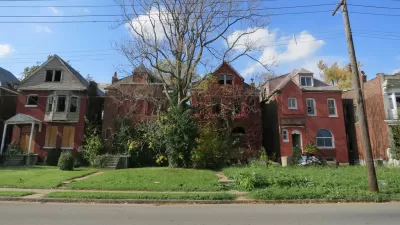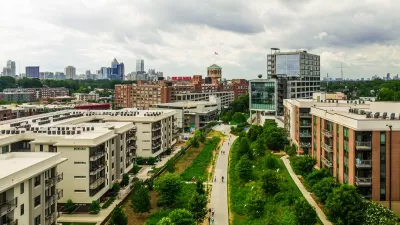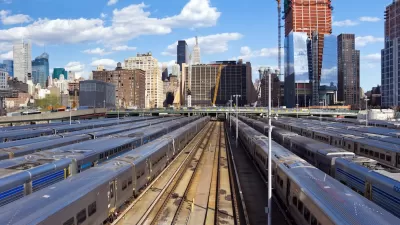The city is considering implementing a fee for developers who reduce the number of units in a rehabbed building in a bid to discourage the loss of housing.

St. Louis aldermen are drafting legislation aimed at maintaining affordable housing in the city, according to an article by Corinne Ruff. As more developers flip multi-family units into single-family homes, some aldermen want to institute a fee that could discourage the loss of units––or, at the very least, create a new revenue stream that could fund affordable housing and help residents displaced by new development and rising rents stay in their homes or find new housing.
According to Ruff, research conducted by Cecilia Boyers using city assessor and Census data shows that the city lost close to 400 units in multi-family buildings in the past five years, and that these conversions tracked closely with displacement of Black and low-income households. The conversions are concentrated in just a few areas of St. Louis, but represent a significant factor in rising rent costs.
The proposed bill is inspired by a Chicago rule that imposes a fee for reducing the number of units in a building. While the fee(proposed at $5,000 per lost unit) may not deter developers, Ruff quotes Alderwoman Megan Green as saying that the program could "funnel that money into a program, potentially the city’s Affordable Housing Trust Fund, that would create more affordable housing for longtime residents in neighborhoods experiencing the most conversions."
FULL STORY: St. Louis is losing multifamily units. Some aldermen want to charge a conversion fee

Study: Maui’s Plan to Convert Vacation Rentals to Long-Term Housing Could Cause Nearly $1 Billion Economic Loss
The plan would reduce visitor accommodation by 25,% resulting in 1,900 jobs lost.

North Texas Transit Leaders Tout Benefits of TOD for Growing Region
At a summit focused on transit-oriented development, policymakers discussed how North Texas’ expanded light rail system can serve as a tool for economic growth.

Why Should We Subsidize Public Transportation?
Many public transit agencies face financial stress due to rising costs, declining fare revenue, and declining subsidies. Transit advocates must provide a strong business case for increasing public transit funding.

How to Make US Trains Faster
Changes to boarding platforms and a switch to electric trains could improve U.S. passenger rail service without the added cost of high-speed rail.

Columbia’s Revitalized ‘Loop’ Is a Hub for Local Entrepreneurs
A focus on small businesses is helping a commercial corridor in Columbia, Missouri thrive.

Invasive Insect Threatens Minnesota’s Ash Forests
The Emerald Ash Borer is a rapidly spreading invasive pest threatening Minnesota’s ash trees, and homeowners are encouraged to plant diverse replacement species, avoid moving ash firewood, and monitor for signs of infestation.
Urban Design for Planners 1: Software Tools
This six-course series explores essential urban design concepts using open source software and equips planners with the tools they need to participate fully in the urban design process.
Planning for Universal Design
Learn the tools for implementing Universal Design in planning regulations.
City of Santa Clarita
Ascent Environmental
Institute for Housing and Urban Development Studies (IHS)
City of Grandview
Harvard GSD Executive Education
Toledo-Lucas County Plan Commissions
Salt Lake City
NYU Wagner Graduate School of Public Service





























